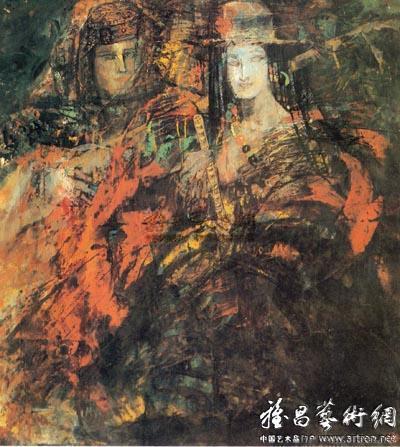Shi Qi has always been something of a rebel in the art world, a man determined to do things his own way. But his strong views on everything may have a lot to do with how he started out in life.
Shi Qi's birth was accompanied by tragedy. With the acclaimed artist's family too poor to feed another mouth, his grandmother decided to sacrifice her own life for the newborn, wrapping herself in a quilt and burning herself to death.
"Today I don't even have a picture of her," recalls 69-year-old Shi. "I only remember that I was six or seven years old when my parents first told me the story."
Born in 1939 in Fuqing, Fujian Province, Shi endured a harsh, miserable childhood.
"Real poverty is not something you can imagine," he says. "Once you suffer it, you can never erase it from your memory, no matter how rich you might later become."
Today Shi's name and his art are well-known throughout the art community, not only because of his unique style but also due to his rather special personality.
The Shanghai Art Fair on September 10-14 will showcase some 30 of Shi's paintings which is quite a rare contribution considering the veteran artist now resides and works in Beijing.
"Don't call me a 'master,' I just wanted to try something different on rice paper instead of repeating what the ancient Chinese masters had done," Shi says. "I really admire those artists who go to extremes in their art pursuits."
And Shi is one of them.
When he was a little boy, Shi loved art even if that only meant making some scratches on the ground.
"When the other boys were playing outside, I always stayed at home painting," he recalls. "During that period, it was impossible for me to have an art teacher. I used my own imagination."

But his talent shone through and Shi was admitted to a local fine art academy, a far different path from that taken by other members of his family.
"One's character decides everything. I feel that my character is quite suitable for an artist with ambition," he says.
Trained in traditional art, Shi rose to fame in the late 1970s. In the years since, he could easily have sat back and led a comfortable life, simply repeating his style.
But he didn't. Instead he tried to fuse traditional ink-wash painting with a modern touch.
"I referred to some Western techniques, like the arrangement and colors from almost 25 years ago," he reveals. "But the result was not satisfactory - it was too simple and shallow."
Shi read many art books and related materials in search of the answer.
"Traditional Chinese paintings are categorized into implicative paintings and realistic paintings, which I think is not visually striking enough particularly in these contemporary times," he explains.
So the artist merged the Western impressionism, abstract and realistic styles under his brushstrokes. In this way, ink-wash strokes run parallel, overlap or blend with some striking oil hues. The comparison in colors, space and visual depth is akin to a "moving" flash.
"Such paintings were severely attacked when they were first unveiled to the public," he says. "It is hard for some traditional artists and critics to accept something that floats away from the mainstream."
Yet Shi's stubbornness prevailed.
"That's me and my style. You can accept it or not," he says.

Shi is an alternative in the art community, he even isolates himself from his peers. "Because many of them lose their honesty and enthusiasm for art," he says. "They rest on their past achievements."
Shi says he would rather go to see exhibitions of young artists.
"They are the hope of the future. Sometimes they are maybe not mature or even on the wrong path, but they still have time to grow."
But time is not something Shi is prepared to waste.
"I have many hobbies, like reading, watching films and traveling," he says. "But I really can't waste my time on them, as painting consumes much of my time.
"Da Vinci wanted to leave 180 masterpieces to the world after his death. But he only left about seven. I am not Da Vinci, so I need more time to produce my 'masterpieces'," he says.
(Shanghai Daily August 15, 2008)